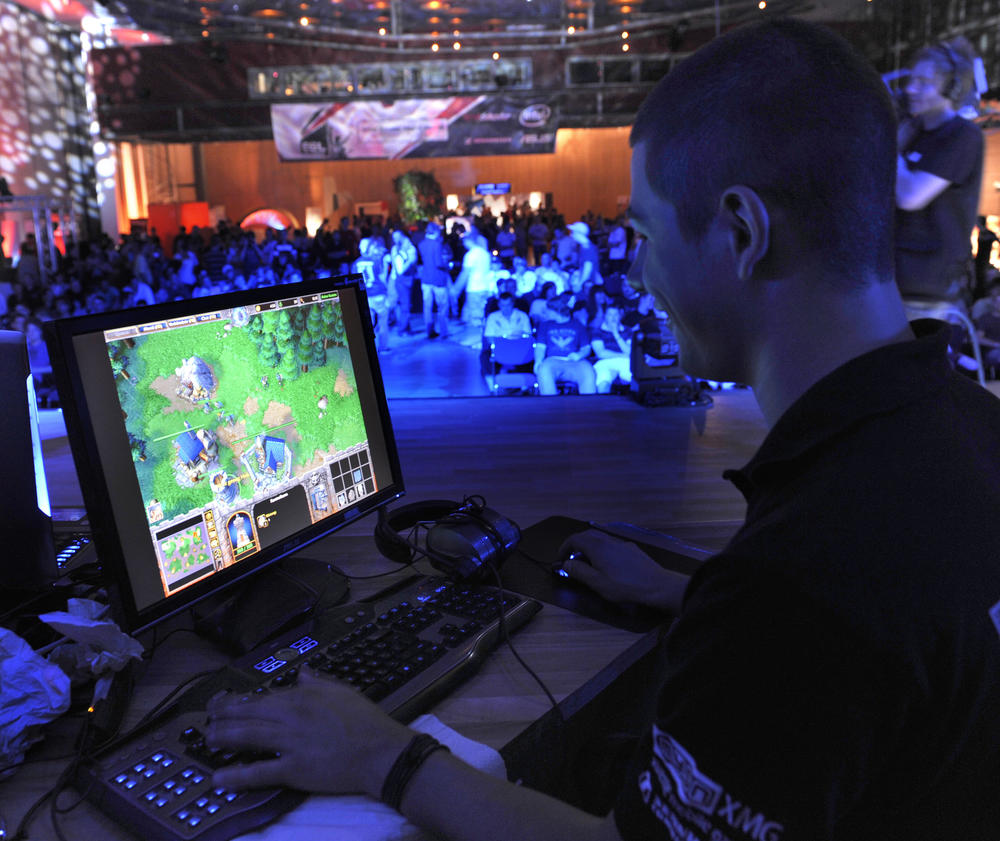Section Branding
Header Content
Orthopedic: 'Esports Athletes Face Injuries Like Traditional Athletes'
Primary Content
Poker and chess are both considered professional sports. Competitive gaming is now on that list. Esports is, in fact, booming. Market watchers predict revenues to hit $1.5 billion by 2020. The gaming industry is so big that Georgia high schools got the green light to form student esports teams in 2018.
As the definition of athletes expands, so do demands to treat gaming-related injuries. Dr. Vonda Wright is an Atlanta-based orthopedic surgeon. She's currently partnering with game developers Skillshot Media to research and treat professional gamers. Wright spoke with On Second Thought host Virginia Prescott about her efforts.
On Second Thought host Virginia Prescott speaks with Dr. Vonda Wright
Interview Highlights
On whether esports gamers are really athletes
I wasn't a fan of esports. I would say look at our children: 30% of them are obese [and] 17% have diabetes. But the more I looked into it and I thought about what the definition of athlete is — playing toward a goal, doing it in groups and winning something— it's not so dissimilar from anything that we traditionally think of.
On the injuries they incur
When I did a deeper dive and I saw that these kids have very short careers, five to seven years, [and] some of them [are] world class athletes. I hesitated to say [athletes] but that's what I've come to really truly believe: they are leaving their games with devastating, life-changing injuries the same way you see on a football field or in gymnastics. So, I thought as an orthopedic surgeon and someone who likes to think ahead of my time, "How am I going to get in front of this and really treat these young athletes like the athletes they are?"
On Dr. Wright’s call to action for other orthopedic surgeons
People who really care about taking care of athletes will want to take care of the neck, shoulder, elbow, and hand injuries that these kids are getting, and to not let six of the top gamers in the world get devastating blood clots in their legs. We really need to take all the amazing things we've learned for sports performance and transfer them to another group of athletes. I think we have to do this. It's the right thing to do.
On prevention vs. care
In traditional athletes, there are things we can do to not only help them with performance but prevent injury. We look for limitations, joint mobility, and limitations of muscle flexibility. We look at overuse patterns, nutrition, sleep, and rest cycles and we do it really well. We know how to create champions by squeezing performance out. What's amazing about esports athletes is that none of this has been done before.
On the mental toll of esports
It’s both a [mental] and [physical] test.They play staring at a screen for very long periods of time so there's mental fatigue; there's eye fatigue. For instance, depending on how you hold your mouse, either you’re making yourself prone to carpal tunnel syndrome or not.
On changing the stigma surrounding eSports
Remember how we just said [esports] is just a bunch of kids sitting in a basement not talking to anybody? Well, now since Georgia high schools have designated gaming a varsity sport, every school in Forsyth County has a gaming team. When one of the high schools got second [place] in the state, those kids who were previously isolated became the school heroes. So, now you’ve raised up an entire new generation of people to celebrate. And when these kids go to college to play their sport — which there are now 31 colleges that give full rides [for esports] — they come out as computer programmers and I.T. people and tech people. It's just very positive all around, from social to societal.
On the money in the esports
In the same way that other traditional athletes make a lot of money, these kids can too. Last year, there was a huge competition here in Atlanta called Dream Hack and the prize money was over $1 million, which blows people's minds when you think that the winner of the Boston Marathon only gets six figures not seven. Right now, we're not at the place like pro baseball where it's $132 million for 13 years but you wait.
On hiding injuries to stay in the game
There's a lot of hiding of injury and gutting it through there. It's not easy to substitute in an esports athlete during a game. So, I think that some of the same issues that we deal with in traditional athletes, we deal with in esports.
On e-sports nutrition
One of the things I really want to affect in esports is the way they eat. We think sugar is great for the brain and, while glucose is the fuel of the brain, a wall of candy and empty calories is not the way to optimize performance. So, we’re getting these kids into a grocery store and helping them make smart food choices. We call it performance foods.
On the similarities between surgeons and gamers
I'm an arthroscopist, which means I am looking at a screen all day and holding instruments in my hand. The things that arthroscopic surgeons retire because of are some of the same things that these gamers experience like neck arthritis. There's actually something called “Phone and Gamers’ Thumb” that hand surgeons deal with [which causes] the joints [to] become arthritic and worn out from overuse.
Get in touch with us.
Twitter: @OSTTalk
Facebook: OnSecondThought
Email: OnSecondThought@gpb.org
Phone: 404-500-9457



